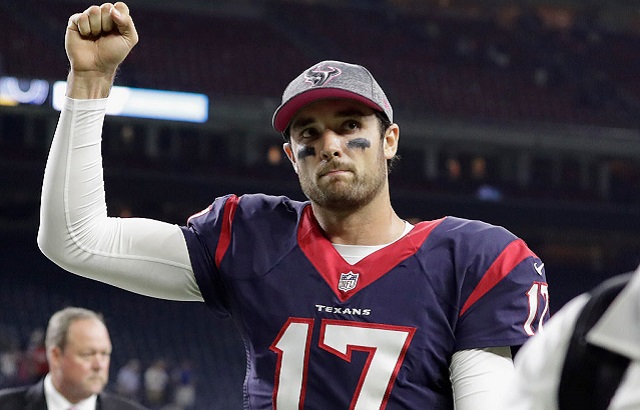The Houston Texans beat the Oakland Raiders on Saturday and it didn’t make a ripple.
In the opening game of this season’s NFL Playoffs, the Oakland Raiders had lost starting quarterback Derek Carr near the end of the regular season, rendering a very promising season effectively dead. The Houston Texans, though experiencing their own quarterback issues, had the NFL’s best defense on their side.
It was the Texans’ second consecutive year hosting a Wild Card game after their second consecutive division title. The NFL’s youngest team (started in 2002) has won the AFC South four times. Their three playoff wins since the 2012 playoffs are tied with the Colts and Panthers for eighth-most in the league.
These all sound like accomplishments, and yet the Texans are still an expansion team to most, or a bit of a forgotten franchise. It took Houston nearly 10 years to make the postseason and even with four trips in this decade, they’ve done virtually nothing with the opportunities.
In the AFC Divisional Round, they’ll line up against the top-seeded New England Patriots as 15-point underdogs, likely cruising toward another double-digit postseason loss. The Texans were downed 30-0 by the Chiefs last season. New England beat them 41-28 in the 2013 Divisional Round, and the Ravens won 20-13 the year before, though the Texans never really felt too close to Baltimore in that game either.

The root of the problem could be the quarterback position, and the question marks that have surrounded it in Houston for 15 years.
Since entering the league, the Texans have started 14 different players under center, anointing a revolving door of passers as the franchise’s next perceived savior. It was first overall pick David Carr in 2002, and hopes rested on him through 2006.
Matt Schaub came aboard in for 2007, but injuries brought in Sage Rosenfels that year and the following one, too. Rosenfels’s 6-4 record as a starter would cast doubts on Schaub, but not enough to dethrone the eventual franchise leader in dozens of categories. Schaub eventually helped bring the team its first playoff berth, yet he was injured again before reaping the benefits. T.J. Yates started the team’s first postseason game in 2012.
After Schaub was Case Keenum, then Ryan Fitzpatrick got his chance to be the hero, as did Ryan Mallett. Brian Hoyer took the reins after, as did Mallett and Yates again. Houston signed Brock Osweiler as the future after the Broncos didn’t resign him this offseason. He’d cede his spot to Tom Savage, who of course got hurt, and handed it right back to Osweiler for the playoffs.
Wide receiver Andre Johnson, running back Arian Foster and then defensive end J.J. Watt took turns as the face of the franchise with QB in so much flux. Watt, as it turns out, was one of the primary reasons for the Texans’ highly accomplished defense these past five or six years. The fact that Houston hasn’t turned that top-ranked D into anything more than a second-round exit is unlikely to help the team’s case.
Jadeveon Clowney was a beast tonight. pic.twitter.com/0zrIfpvwRG
— Ari Meirov (@MySportsUpdate) January 8, 2017
Having the league’s best defense, or one of them, is why they’re good. Failing to convert that into anything close to a championship is why they’re not regarded as much at all. There’s a precedent for defense turning into titles, after all. Denver (Super Bowl 50), Seattle (XLVIII), the New York Giants (four separate times), and others have proven it repeatedly. The Texans have failed to sniff those heights, while Watt has struggled to stay on the field in recent years. The three-time Defensive Player of the Year has even mentioned retirement a couple times.
And if the reason for Houston’s virtual anonymity isn’t the rotating quarterback situation or a defense that can’t seem to equate to playoff success, then perhaps the ghost of their city’s former team inhibits them most of all.
The franchise formerly known as the Houston Oilers is still living. The now-Tennessee Titans face the Texans twice a year as rivals in the lackluster AFC South. But the fervor garnered by the Oilers and heights that franchise was able to reach is far from forgotten.
Their predecessors, the Oilers, kicked off the old AFL by winning the league’s first two championships in 1960 and 1961 (and they’d narrowly miss a third in 1962). The franchise sported future hall-of-famers like Warren Moon and Earl Campbell, among others. Their longtime home, the AstroDome, was among the most iconic sports venues for decades. From 1960 to 1991, the Oilers won nine playoff games.
Even the Titans, who moved from Houston to Nashville for the 1997 season, and were renamed in 1999, experienced enough success early in their new home city to overshadow the eventual Texans. Tennessee would come up a yard short of forcing overtime in Super Bowl XXXIV, and won five playoffs games in a five-year stretch from ’99 through 2003.

Houston also has no financial excuse for being anything less than great, or doing anything but winning the NFL’s worst division. The Texans have been among the 10 most valuable teams in the league for nearly their entire existence. They ranked no. 9 overall on Forbes’ 2016 list, worth $2.6 billion.
But still, despite being this “good” on and off the field, the Texans remain a franchise without much identity, success or reason to be without either of those things. In a football-mad city and state, the Houston Texans should be a powerhouse. Instead, they’re a team that’s proven they can be a moderate winner (they have more seasons at .500 or better than they do below it). However, they remain the “worst” of the NFL’s successful franchises because they can’t translate all of that into fielding a team talented enough (or recognizable enough) to win it all.
Perhaps that changes on Saturday against the heavily-favored Patriots. But it’s more likely that the banged-up Texans bow out in the second round once again. If they prove everyone wrong vs. the Pats, then that label of “worst” almost immediately washes away – potentially for good.







